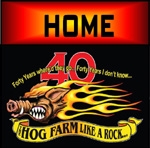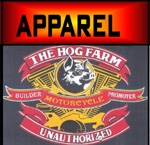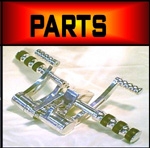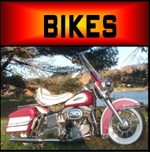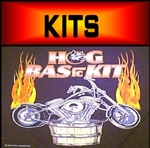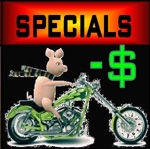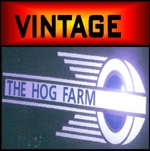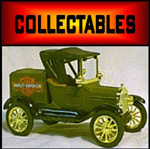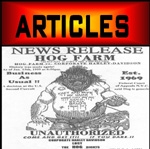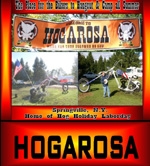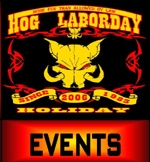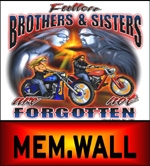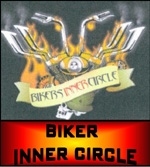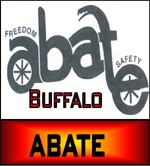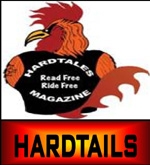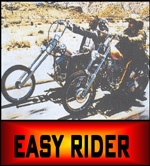
Hog Farm Trial Less Than Easy Ride Harley Davidson's federal court battle last week to take away the name Hog Farm from a West Seneca motorcycle shop was a little like watching a group of bikers roar through a small town on their Harleys. There was a lot of noise, a bit of smoke and some colorful characters. But after it was all over, you were left wondering just what it was you saw. On the one side were Ruth and Ron Grottanelli, the Hog Farm owners, who brought in two-dozen bikers for the trial's start Monday to support their right to a name they first used in 1969. To them, a hog is a big bike. All Harleys are hogs, they say, but not all hogs are Harleys. Opposing them were the lawyers from Harley Davidson, the Milwaukee motorcycle manufacturer that rose from the ashes and now makes bikes so popular that buyers sometimes wait a year for delivery. To them, a hog is a Harley. Period. Since the 1980s, they've searched the country for shops and companies with the word "hog," trying to force them to stop using what they feel is Harley's property. The bikers supporting the Hog Farm, dressed in leathers and jeans, many with full beards and ponytails, squeezed uncomfortably into narrow wooden benches as they filled every available space in the courtroom of U.S. Magistrate Judge Edmund F. Maxwell. They came in honor of Grott, as the Hog Farm owner is known, whom they consider one of their own. Back when Harley Davidson seemed about to go under in the 1970s, owned by AMF and trying to survive by making golf carts and treating longhaired bikers like they needed a bath, Grott was taking Harleys and chopping them into creations that looked like the bikes Peter Fonda and Dennis Hopper rode in "Easy Rider." Bikers such as Grott didn't just ride Harleys; they became their way of life. While more and more Japanese motorcycles were sold in America, independent bike-shop owners like Grott, a onetime Hells Angle, say they kept the Harley flame alive during those lean years. Harley is prospering now, they say, because the Milwaukee company saw how popular the chopped bikes had become. It started producing more customized-looking Harleys whose growing market now includes film celebrities and sports stars. Showing up in court to support Grott was one thing for the bikers. Sitting through day after day of dry, tedious testimony about trademark registrations was another. The bikers came and went in mass Monday, and only a handful returned during the week. On the other side of the courtroom were the attorneys for Harley Davidson, three lawyers steeped in the esoteric world of trademark law and fighting hard to overcome the image of a big corporation coming down on a small motorcycle shop. "Harley Davidson is not trying to hurt these people," attorney Michael E. Husmann said in an interview outside the courtroom. "All they are trying to do is protect their trademarks." If Harley gave shops like the Hog Farm free use over its name, he said, what would stop Kawasaki or Honda or Yamaha from producing models called Hogs? And that's what four says of testimony before Maxwell came down to: What exactly is a hog in the motorcycle world, and who is entitled to use the name? On dates alone, the Grottanellis would appear to win kickstands down. The Hog Farm's business certificate was approved in 1969. Harley did not register a trademark for H.O.G., or the Harley Owners Group, until 1986. But it's not that simple, said Dyann L. Kostello, another Harley Attorney. In the public's mind, she said a hog always has been known as a Harley, long before the Hog Farm ever started business. She said the courts have held that companies have the right to protect such associations. But Grottanelli does not concede her point. A hog, in his view, May be a Harley, but it also might be an Indian, or a Triumph, or another large cycle that has been chopped and channeled. "You certainly have a memory lapse," Grottanelli wrote to the company when it started demanding he stop using the word. "In the 50s, 60s and 70s, Harley Davidson hated the word hog, you wanted no association," he wrote. "You cringed whenever Harleys were included in discussion about motorcycles called hogs by the people that rode them, they were a means of escape from the square world." So in an attempt to show what a hog was, the trial produced the most unlikely of scenes. The well-dressed lawyers from Harley, and Peter Sommer, the Hog Farm's attorney from the corporate firm of Phillips, Lytle, Hitchcock, Blaine, & Huber, spent the week thumbing through motorcycle magazines called Easy Rider and Chopper or the Jammers Handbook trying to one-up each other on weather a hog is a Harley or not. The hearing even included a cameo appearance by attorney Paul Cambria, a Harley owner who has ridden with Arnold Schwarzenegger. Cambria said he has always heard the word hog used to describe Harleys. Harley also called on Thomas C. Bolfort, a company vice president who wrote a history of Harley Davidson, whose testimony included descriptions of Harley engines known as panheads, shovelheads and knuckleheads. What does the word hog mean? He was asked. "A big Harley," Bolfort replied. "I've never heard it in referring to another motorcycle other than a Harley." But Sommer, the Hog Farm's attorney, showed Bolfort a copy of his book and asked if he ever called a Harley a hog in the chapter dealing with Harley Davidson's history. "I don't believe so," the company official said. All the witnesses finished Thursday, but the trial will not be over until the lawyers submit final arguments on December to Maxwell. He will then rule on whether the Hog Farm has the right to keep calling itself that. Maxwell, who has continued as federal magistrate judge past his scheduled retirement, showed he is getting up to speed on the issue. "This will be marked exhibit No. 173B as in Baker," he said of a piece of evidence as the trial wrapped up, then quickly corrected himself; "As in Biker, I mean."
721 Mineral Springs Road |
